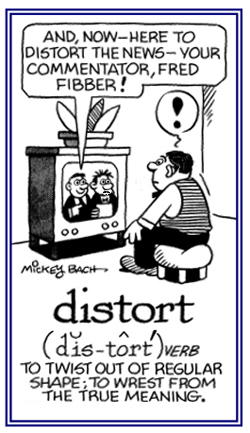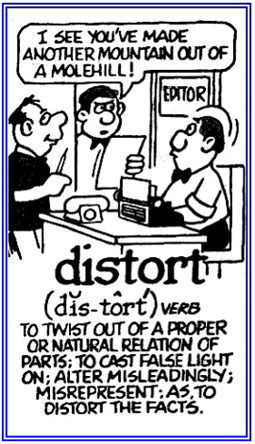dis-, di-, dif-
(Latin: separation, apart, asunder; removal, away, from; negation, deprivation, undoing, reversal, utterly, completely; in different directions)
The meaning of dis- varies with different words; dif-, assimilated form of dis- before f; di-, form of dis- before b, d, g, l, m, n, r, and v.
distensive
distention
A distending or being distended; inflation; expansion; stretching.
distichiasis
A congenital, abnormal, additional row of eyelashes.
distinct (adjective), more distinct, most distinct
A reference to something that is well-defined and discrete: There are people who are distinct individuals and easily separated in one's mind from others.
distinctive (adjective), more distinctive, most distinctive
Characteristic of something that can be set apart and be recognized as being different: Most educated people have distinctive skills that are very different from those who have not learned to enhance their knowledge and reasoning abilities.
distinctively (adverb), more distinctively, most distinctively
distinctiveness (noun) (usually no plural)
distinctly (adjective), more distinctly, most distinctly
distinguishable (adjective), more distinguishable, most distinguishable
1. Capable of being recognized as different or conspicuous: The color black is distinguishable and perceptible against a white surface.
2. Susceptible of being heard or seen under difficult circumstances: The people in the next apartment were having a loud argument, but the words they shouted were not distinguishable and could not be understood.
2. Susceptible of being heard or seen under difficult circumstances: The people in the next apartment were having a loud argument, but the words they shouted were not distinguishable and could not be understood.
distinguishably (adverb), more distinguishably, most distinguishably
Concerning how something or people can be perceived as being dissimilar: The children looked at the tulips and saw that they were distinguishably different from each other because one was red and the other one was white.
distort (verb), distorts; distorted; distorting
1. To bend, twist, stretch, or force something out of its usual or natural shape, or to be made to do this: The terrible pain in Mildred's neck was distorting her face.
2. To describe, or to report, something in an inaccurate or misleading way: The reporter distorted what the mayor actually said regarding the repairs to the city hall.
3. To make something unclear or unrecognizable; for example, to change something; The photograph of the robber at the bank appeared in the newspaper in such a way that it was too distorted and so it was unclear and unrecognizable.

© ALL rights are reserved.

© ALL rights are reserved.
Go to this Word A Day Revisited Index
2. To describe, or to report, something in an inaccurate or misleading way: The reporter distorted what the mayor actually said regarding the repairs to the city hall.
3. To make something unclear or unrecognizable; for example, to change something; The photograph of the robber at the bank appeared in the newspaper in such a way that it was too distorted and so it was unclear and unrecognizable.


Go to this Word A Day Revisited Index
so you can see more of Mickey Bach's cartoons.
distortedly (adverb), more distortedly, most distortedly
1. A reference to altering or misrepresenting something; such as, facts.
2. Relating to twisting out of shape or deforming.
3. In electronics, characterized by reproduction or amplification of something inaccurately; such as, to reproduce a signal falsely.
2. Relating to twisting out of shape or deforming.
3. In electronics, characterized by reproduction or amplification of something inaccurately; such as, to reproduce a signal falsely.


